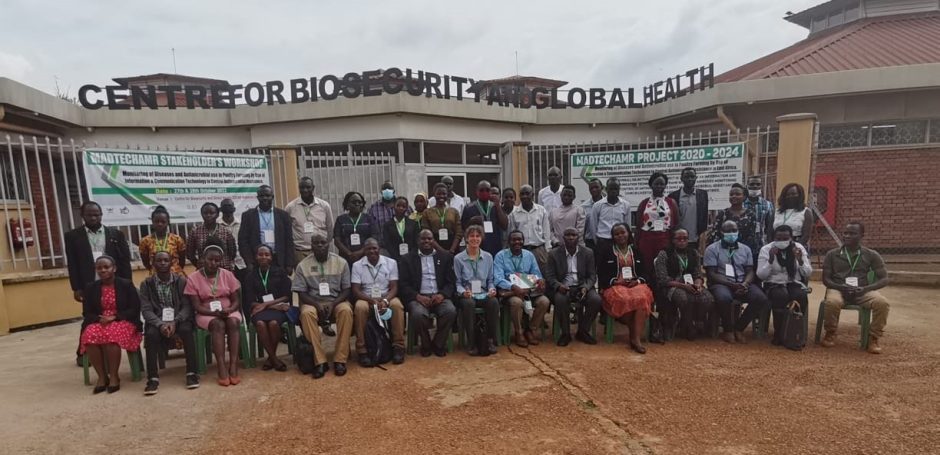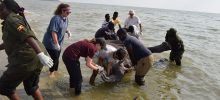Researchers utilize ICT to monitor and address Antimicrobial Use (AMU) and Antimicrobial Resistance (AMR) in Animals
Story by Joseph Odoi & Harriet Musinguzi
A consortium of researchers from COVAB-Makerere University, International Livestock Research Institute (ILRI), Kenya, University of Nairobi and Swedish University of Agriculture Sciences (SLU) have developed an Information, Communication and Technology (ICT) system to address Anti-microbial resistance and monitor antibiotic usage in Livestock starting with poultry industry. This innovation comes at a time when AMR is emerging as a global health concern
Antimicrobial Resistance occurs when some of the germs (bacteria, virus, or fungus) that cause infections resist the effects of the medicines used to treat them. This may lead to ‘treatment failure’, or the inability to treat the cause of the infection.
The main drivers of antimicrobial resistance include the misuse and overuse of antimicrobials; lack of access to clean water, sanitation, and hygiene (WASH) for both humans and animals; poor infection and disease prevention and control in health-care facilities and farms; poor access to quality, affordable medicines, vaccines and diagnostics; lack of awareness and knowledge; and lack of enforcement of legislation.
To counter this trend,a two-day Project workshop titled Management of animal diseases and antimicrobial use by information and communication technology to control antimicrobial resistance in East Africa (MAD-tech AMR project 2022-2024 ) was convened at CoVAB) by the project Co-investigator Associate Professor Lawrence Mugisha aimed at sharing progress made by the research team.
The workshop was opened by the College Principal represented by Prof. Robert Tweyongyere, the Dean School of Veterinary Medicine and Animal resources, College of Veterinary Medicine, Animal resources and Biosecurity (CoVAB),who in a special way welcomed the participants to Makerere University. 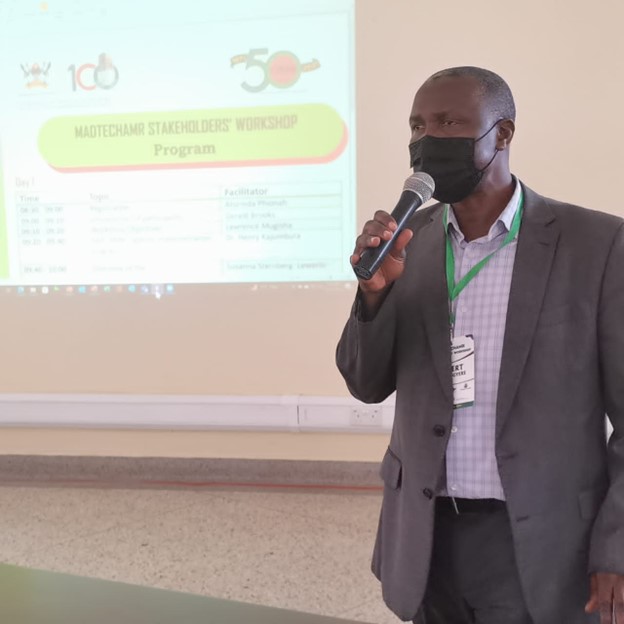
Prof. Robert Tweyongyere, the Dean School of Veterinary Medicine and Animal resources, College of Veterinary Medicine, Animal resources and Biosecurity (CoVAB) giving his remarks.
He noted that with support from Swedish University of Agricultural Sciences effective 12th June 2020, Makerere University in collaboration with Sweden, the International Livestock Research Institute (ILRI) Kenya, and University of Nairobi, the researchers embarked on implementing the MAD-tech-AMR project that aimed at providing an Information and Communication Technology (ICT) framework for improved monitoring and control of antimicrobial use (AMU) and antimicrobial resistance (AMR) in livestock in low and middle-income countries.
Prof. Robert Tweyongyere, who represented the Principal CoVAB, Prof. Frank Nobert Mwiine at the official opening of the two day engagement further revealed that antimicrobial resistance is now a leading global health and development threat thus needs urgent attention.
“Tools to monitor antimicrobial Usage are very important and that is why the MAD-tech-AMR project is necessary in this day”. One of the biggest challenge we have is data collection and storage around AMR which this project is solving . Additionally , We are yet to see the toll of microbial resistance. This research will bring out some fundamental issues given that microbial resistance is still a concept, yet to be appreciated’ he noted.
He equally thanked the project team led by Prof. Lawrence Mugisha for undertaking the project that affects every one’s livelihood.
Prof. Lawrence Mugisha, the Principal Investigator at Makerere University, in a summary update of MAD-tech-AMR project said if left unchecked by 2050, AMR may contribute to up to 10 million deaths per year with low- and middle-income countries (LMICs) like Africa being victims.
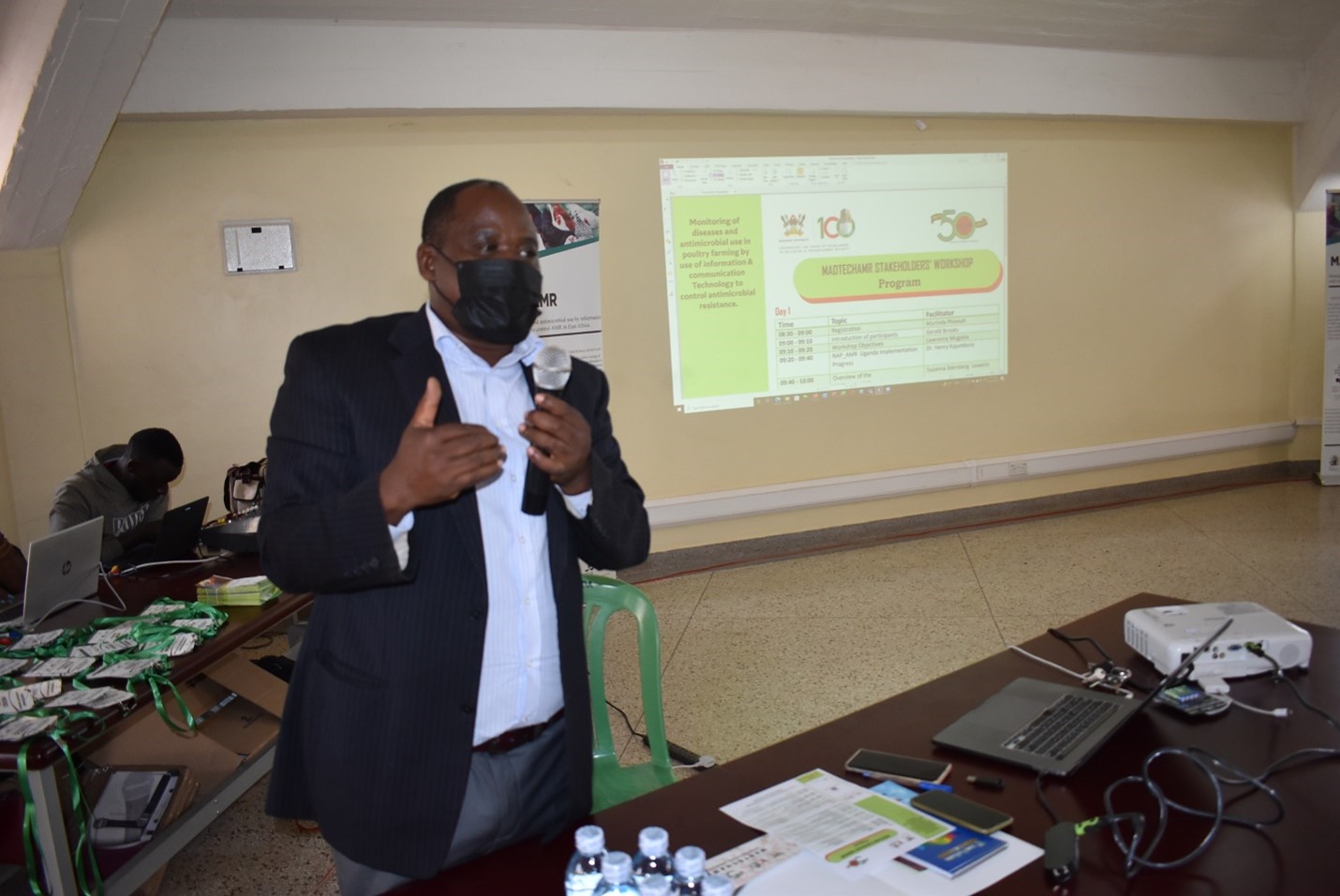
Prof. Lawrence Mugisha makes his presentation at the workshop
In Context to Uganda, Prof. Lawrence Mugisha noted that with 80% of Ugandans depending on agriculture, the cost of AMR to the national economy and its health systems is significant and thus needs urgent attention. He emphasized the importance of a multi-sectoral approach if sustainable development goals are to be achieved. He said that AMR has a great Impact on SDG1 (no poverty), SDG2 (zero hunger), SGD3 (good health and wellbeing), SDG6 (clean water and sanitation), SDG 8 (Decent work and economic growth), and SGD12 (responsible consumption and production). Prof. Mugisha also shared the way forward to address the AMR challenges and these were;
- Raising public awareness about AMR
- Maintenance of sanitation and hygiene
- Surveillance
- Investing in human capital for innovative vaccines like herbal for the replacement of Antibiotic use.
As part of the study, researchers addressed the following key findings from the study;
- Antibiotics were the most used drug by livestock farmers followed by dewormers. More so respiratory related infections was the most reported case followed by digestive problems like diarrhea. The most used antibiotic by farmers was Oxytetracycline Hydrochloride and procaine.
- 2% of the farmers were female and 21.4% had attained a degree. Their mean age was 37.5 years. Most of the farmers specialized in Economics and business-related studies followed by those with no specific field of study. Majority of the farmers were funded by project owners (78.95%) and household members (16.14%). There were mainly managed by hired labor (44.56%) and household members (33.33%).
- Worms and Typhoid were reported to be the biggest threat in regards to the health status of birds.
- In terms of Management Practices, regular cleaning and disinfection were highly practiced by farmers.
- Most farmers bought drugs from VET Shops and also consulted VETs
- In regards to IT use, 97% of the farmers, and 100% of drug sellers and feed dealers have mobile phones; 69% of farmers had smart phones and were MTN and Airtel subscribers, and most too used the internet daily.
- 70% of the veterinary doctors wished to call farmers
- WhatsApp platforms and Facebook were the most commonly used online Channels

Prof. Lawrence Mugisha further emphasized that using the current ICT system developed by MAD-Tech-AMR team could favour the use of mobile phones in monitoring AMU and AMR. ‘It would also be easy to work with common telecommunication companies (MTN and Airtel) to whom farmers had already subscribed. Real-time communication with veterinary doctors, feed dealers, drug sellers, and farmers themselves would be made easy. Since 80% of the farmers do farm-related activities, so deploying an IT system is easy in monitoring AMR use, he explained.
As part of monitoring AMU and AMR, Wangoru Kihara from MAD-tech-AMR Project, Kenya shared a brief architecture of the upcoming IT application named: “Animal Disease Information System (ADIS) application developed by the Project which can link farmers to veterinary drug/pharmacy owners and veterinarians to get help in real-time.
In this Platform;
- Different users like farmers(farmers, agrovets, vets) can download the application, register and log in.
- After logging in, they can report a disease or browse disease symptoms or share drug usage details on their farms.
- Access is through smartphones, computers, laptops.
- Real-time processing of data is possible for users to visualize: agrovets- drugs sold, farms – disease history
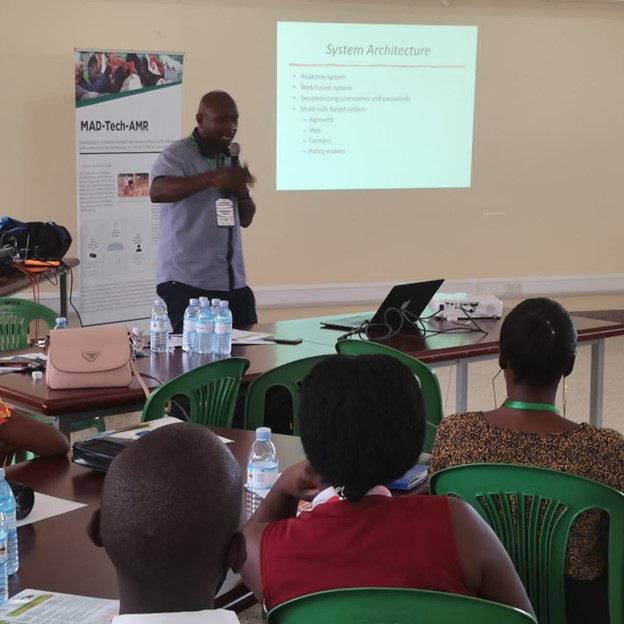
Mr. Wangoru Kihara explains the ADIS system developed by MADTECH project
In her presentation centered on the MAD-tech-AMR project aims and objectives, Professor Susanna Sternberg Lewerin from Swedish University of Agricultural Sciences, Department of Biomedical Sciences & Veterinary Public Health revealed that although Antibiotics are powerful medical tools that allow curing of serious infectious diseases in people and animals, it also has the ability to trigger bacteria to develop resistance to drugs thus the need to consult with professional practitioners before use.
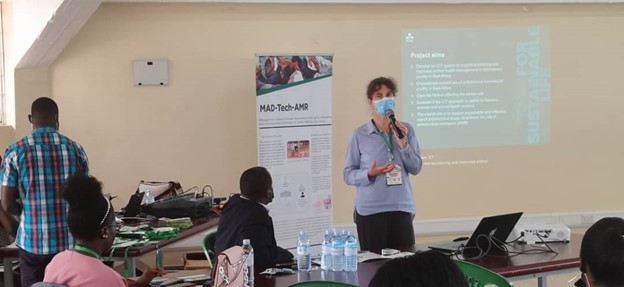
Dr. Sussanna Sternberg making a presentation at the event.
In context to bacteria developing resistance to drugs, Dr. Henry Kajumbula from the Department of Microbiology, Makerere University College of Health Sciences noted that in 2015, a situation analysis was conducted by the Uganda National Academic Science (UNAS) and it was found that some of the most reliable antibiotics with a high safety margin and great effectiveness were found to meet a high resistance of about 40%. “The prevailing conditions of hygiene and sanitation in our health care system also drive resistance to antibiotics. Because of this situation, micro organisms become resistant to the most potent antibiotics. This situation is being recognised in the human health system because of the increase in bacterial infections which are failing to be treated” explained Dr. Kajumbula
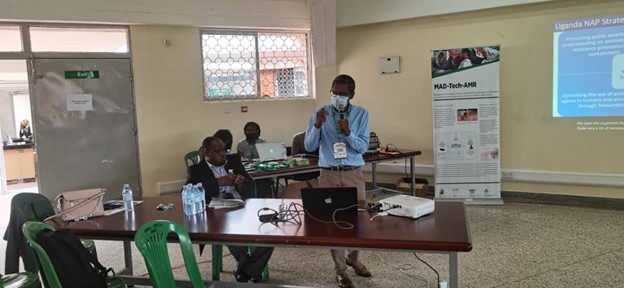
Dr. Kajumbula making a presentation at the event.
Moving forward, the MAD-TECH-AMR project team called upon farmers, Agrovets and policy makers to make use of the Animal Disease Information System that will be rolled out soon .
During this event, participants namely farmers, agrovets, policy makers among others were trained how to use Animal Disease Information System (ADIS) specifically how to log in, report a disease or share drug usage details by the ICT expert in the workshop. Some of the key questions raised by participants include if the ADIS system will be translated into local languages and sustainability among others.
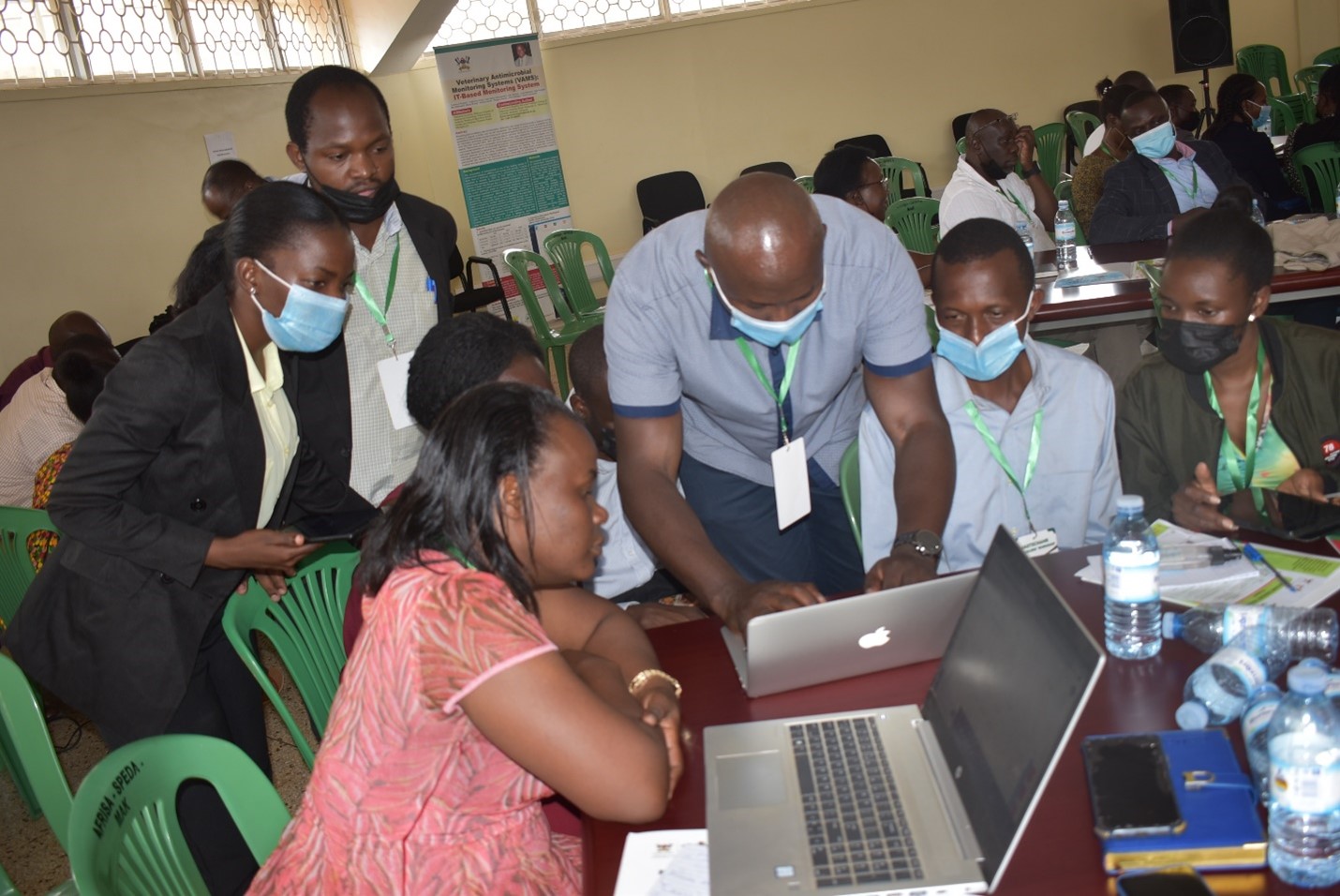
The ICT Expert Kihara demonstrates to participants how to log in and use the ADIS system
The MAD-Tech-AMR stakeholder engagement kicked off on Thursday 27th October 2022 at the Biosecurity centre in the College of Veterinary medicine, Animal Resources and Biosecurity (CoVAB) and will run until Friday 28th October 2022.
More about the Project
MAD-tech-AMR is a partnership between Swedish University of Agricultural Sciences, Sweden, International Livestock Research Institute, Kenya, Makerere University, Uganda, and University of Nairobi, Kenya
This project is designed to provide proof of concept, applying a framework for surveillance of AMU, diseases that trigger AMU, and perceived problems with AMR, in East African poultry production systems. Information and Communication Technology (ICT) will be coupled with veterinary epidemiology and social science methods.
The ICT framework developed by the project will be pilot-tested in selected poultry production systems in Kenya and Uganda. The framework may be expanded in the future to allow the inclusion of diagnostic tools, but the initial focus is on clinical diagnosis based on tele-consultation and evidence-based therapeutic strategies.
Project Partners
- Susanna Sternberg Lewerin, Swedish University of Agricultural Sciences, Sweden (Coordinator)
- Florence Mutua, International Livestock Research Institute, Kenya
- Lawrence Mugisha, Makerere University, Uganda
- Joshua Onono, University of Nairobi, Kenya


